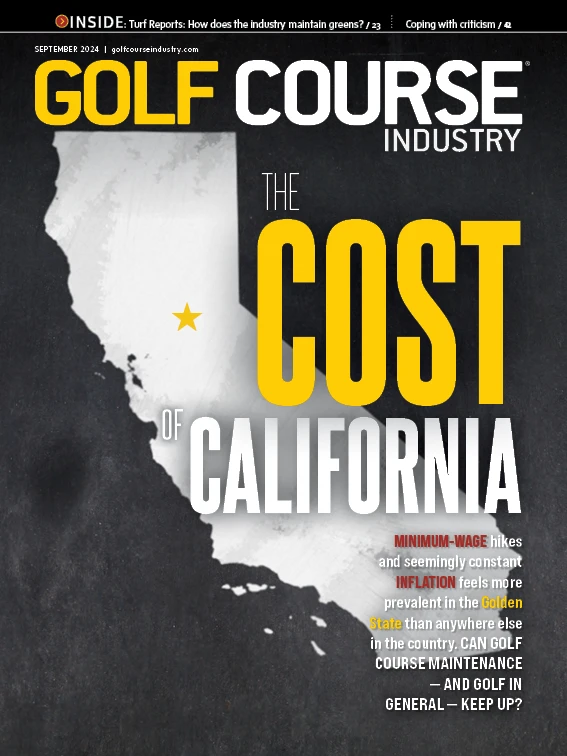
Can you feel the first hints of fall? Leaves beginning to change into their autumn colors? Temperatures starting to cool?
That’s wishful thinking for many superintendents mired in the dog days of summer, trying to keep their courses healthy, their golfers happy and their crews safe in the midst of record-breaking heat. But just as the weather will eventually begin to turn, so will 2025 budgets soon be due on owners’ and managers’ desks.
Hopefully, you are well underway with your planning: reviewing results from this year, discussing goals for next year with your club’s and facility’s decision-makers, projecting labor and product costs, and making fact-based assumptions about what 2025 will bring. Or maybe you’re just starting to focus on next year’s budget. In either case, you may be among those who are starting to feel the pressure that accompanies the annual budget development and approval process.
If so, you might remind yourself of one of the tenets of Dale Carnegie, whose best-selling self-improvement book, “How to Win Friends and Influence People” has helped millions improve their public speaking and interpersonal skills, is persuading — not arguing — so that others believe what you want is actually their idea.
Here’s how the most effective superintendents pull that off:
1. Budget to make your agronomic plan real. What resources do you need to make your course all that it can be? How will your plan improve golfers’ enjoyment of your course?
- Describe your course in its best condition.
- Explain how your plan — adequately budgeted — will make the course what you, your owners, managers and members want.
- Be bold with your aspirations. Aim big and win big.
2. Inform and educate. Those up the organizational chart are not the scientists and turf professionals that you are. Get ahead of your budget presentation by providing ample background information. They need information and understanding to support your plan. Focus on the benefits: more rounds, increased revenues, happier members and customers.
- Schedule meetings with the people who need to be persuaded and educated about your budget. Listen to their wants, needs and concerns.
- Address each of their key issues when you present your budget to demonstrate you listened and have responded.
3. Follow up. After each meeting, conduct one-on-one conversations with each of your supervisors. Listen to their observations. Help them believe you can do what they want when adequately resourced. Be confident in your abilities to accomplish the goals set for your course. Be willing to take a position that requires your best thinking and top performance.
- Don’t equivocate. This is no time for “I’ll do my best” and other hollow promises. Tell them and then show them what you can do.
- Engage your crew to ensure that all direct reports know what you want to accomplish and make them allies.
- Let criticism sharpen your plan and your resolve to deliver a budget that meets as many objectives as possible.
4. Schedule quarterly updates. Conduct on-course tours and discussions to show those up the management organization what you and your team are accomplishing. Show them the adversities with which you are dealing. And show them your successes. Help them to be as enthusiastic about your work as you are. Carnegie might tell you, “When dealing with people, remember you are not dealing with creatures of logic, but creatures of emotion.”
- Follow up with photos and videos for decision-makers and golfers to demonstrate progress toward budgetary goals.
- Invite your golfers to join you for on-course field days to see how your work is affecting their course and (hopefully) improving their enjoyment.
- Invite local Scout troops to see the course and your efforts as an environmental steward. Those children will tell their parents about your team’s accomplishments.
5. Own it. Wrap up 2025 — and begin the 2026 budget season — with your annual report of effectiveness of your agronomic plan. Put your successes in terms of accomplishing mutually agreed-upon objectives.
- Put any missteps or unmet goals on your shoulders. Communicate lessons learned and how they will be applied.
- Produce a short video thanking everyone for their support.
Carnegie may have never prepared a budget to govern the spending and agronomic practices of a golf course. But when he said, “Success is getting what you want. Happiness is wanting what you get,” you get the idea that he understood your challenge.

Explore the September 2024 Issue
Check out more from this issue and find your next story to read.
Latest from Golf Course Industry
- From the publisher’s pen: Conscientious of a bigger role
- Bernhard and Company partners with Laguna Golf Phuket
- Terre Blanche showcases environmental stewardship
- VIDEO: Introducing our December issue
- Bernhard and Company introduces Soil Scout
- Nu-Pipe donates to GCSAA Foundation’s Centennial Campaign
- GCSAA enhances golf course BMP tool
- Melrose leadership programs sending 18 to 2026 GCSAA Conference and Trade Show





